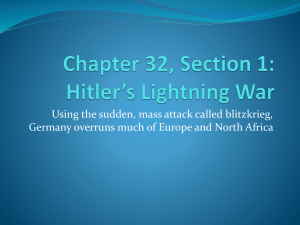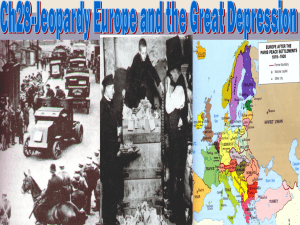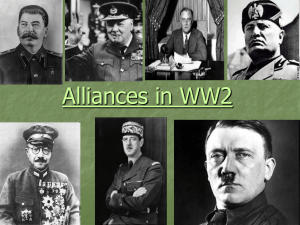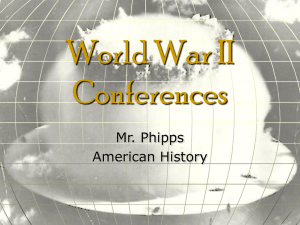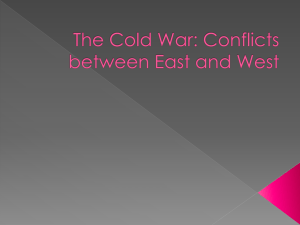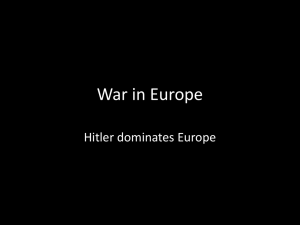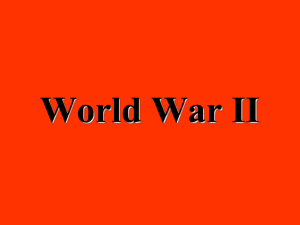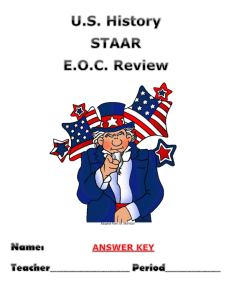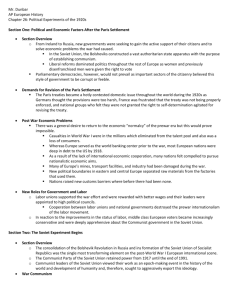Unit 8 spring 2009x
advertisement
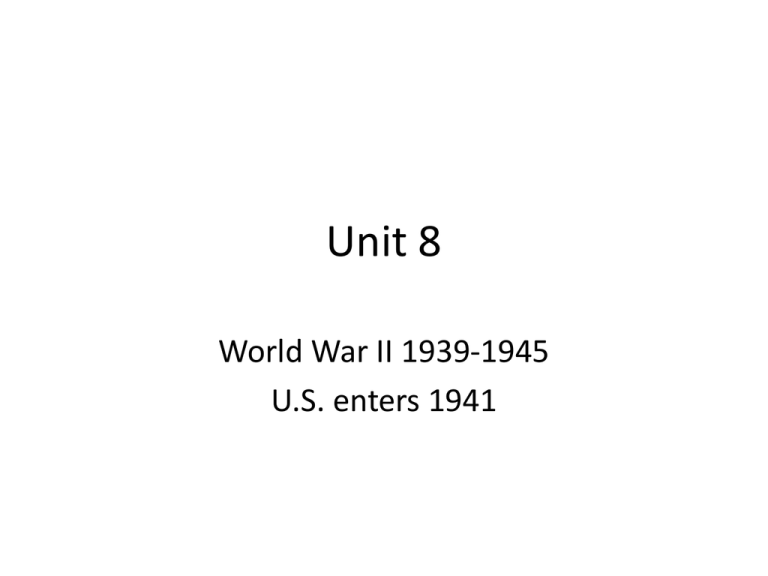
Unit 8 World War II 1939-1945 U.S. enters 1941 • SSUSH 19 : The students will identify the origins, major developments, and the domestic impact of world War II, especially the growth of the Federal Government Beach Invasion of Normandy Causes of World War II • Great Depression • Rise of Totalitarian Governments • Treaty of Versailles- Made Germany go into debt • The need for resources Totalitarian Govt • Totalitarian- governments who restricted person freedoms and prohibited political opposition – Adolf Hitler- leader of Germany (NAZI party) – Benito Mussolini – Leader of Italy Hitler’s Aggression and Appeasement • • • • the Hitler took over all these lands Rhineland Annexed Austria Annexed Sudetenland(western Czechoslovakia) • Great Britain and France did nothing and signed treaty with Germany this was called appeasement Japan • Japan started seizing land for resources • Manchuria(part of china) was taken over by Japan. Opposing sides • Axis -Germany, Italy, Japan • Germany- Hitler; • Italy - Mussolini ; • Japan- Emperor Hirohito • Allies- France, Britain, United States (1941), Soviet Union –Soviet Union –Joseph Stalin –Britain – Winston Churchill –U.S. – Franklin D. Roosevelt / Truman Hitler Mussolini Axis leaders Hirohito Totalitarian/Fascist Dictators Hitler and Mussolini Allies Churchill, Roosevelt, & Stalin Unites states Reaction to Japan and Germany • Neutrality act- United States would not take sides • A. Phillip Randolph- was going to march on Washington to get African Americans equal employment in the military World War II Begins1939-1945 • Sept. 1 1939 Hitler invaded Poland. This started the War. • Hitler Signed treaty with Soviet leader Joseph Stalin- non aggression pact. Would not fight each other Germany’s Blitzkrieg • Blitzkrieg – Germany's lighten fast warfare • Germany conquered Denmark, Norway, Poland, Belgium, Netherlands, and France in less than a month • Battle of Britain – German planes bombed Britain airfields and civil areas in London at night – Royal Air force- Britain’s air force • Lend-lease act- send aid to countries and could defer payment until later. – Roosevelt said “if a neighbors house is on fire you don’t sell him a hose”, “you give him a hose, then you get it back after the fire is out. This help your neighbor and makes sure that the fire doesn’t’ spread to your house. “ • Dec. 7 1941 Japan attacked US naval fleet in Pearl Harbor, Hawaii. This brought the united States into World War II – Dozen naval vessels damaged , 200 warplanes destroyed, and 3000 people killed or wounded. – FDR said, “This was a day which will live in infamy” D-Day (operation overlord) • D-Day or operation overlord (June 6, 1944) was the largest amphibious invasion ever on the beaches of Normandy, France. • led by Supreme Commander Dwight D. Eisenhower. D-day(operation overlord ) June 6 1944 • Hitler committed suicide when Berlin fell. • Germany surrendered and allies countries celebrated V-E Day(victory over Europe day) may 8 1945 • Holocaust • Hitler Proposed the final solution • Final solution- killing of all Jews • Concentration camps- where Jews were sent to work or killed immediately • 6-10 million Jews died this was called the holocaust • Auschwitz was the most notorious concentration camp War in the Pacific • Battle of Midway- this is the turning point of the war in the war • The U.S. decided to do island hoppingconquer one group of islands then move to the next. • MacArthur- returned to Philippines: said, “I shall return” and he did • Iwo Jima and Okinawa cleared the way for invasion of japan Atomic Bomb • Manhattan project led by Oppenheimerinvention of atomic bomb at los Alamos, New Mexico. • Enola Gay dropped the atomic bomb on Hiroshima. • Then on Nagasaki. • V-J Day (victory over Japan Day) Aug 14, 1945 – Japan unconditionally surrender s • War Production Board (WPA)- transforms economy from peacetime to wartime. • Victory gardens • Rationing- could only buy so much of certain materials. WWII • Rosie the Riveter- describes a woman working in the factory where men used to. • SUSH 20 The student will analyze the domestic and international impact of the cold war on the united states. • SSUSH 21: The students will explain comic growth and its impact on the United States 1945- 1970 The Iron Curtain • Iron Curtain – was an imaginary line between the democratic western part of Europe and the communist ran eastern part of Europe • Containment policy- said to keep communism where it was and not let it spread to other countries • Truman doctrine- U.S. would not hesitate to help nations to defend against communism. • Marshall plan- provided nations in war torn Europe with financial support from U.S. • Germany was divided among U.S., Britain, France and Soviet Union. • Berlin which was in the part controlled by the soviets was also split. West Berlin allies, east Berlin Soviet union. • Berlin airlift- when the u.s and British planes supplied west Berlin because the soviet union would not let allies use the roads. • Cold War (1945-1991)- the tension between the U.S. and the soviet Union (no shots were fired) Korean War 1950-1953-Containment policy (domino Theory ) • • • • • Divided among the 38th parallel. Northern – communist Southern – democratic Police action At the end country still divided at the 38th parallel. Red Scare 1940’s and 50’s • Red scare- thought people were communist • HUAC- House Un-American Activities Committee- root out communist in the federal government • McCarthyism- Sen Joseph McCarthy- the ideas that there were communist in the state department • GI Bill– Job priority, – Money for education – Training, loans – Purchase of new home and property • Baby boom- explosion of population after world war II 40’s and 50’s • National highway act- called for a federal interstate highway system enacted by president Eisenhower Kennedy Nixon Debate • Television – showed Kennedy as cool and collective, Nixon looked nervous and sweated. • Nixon lost the election to Kennedy 1960 because of TV. • Sputnik- the first artificial satellite to orbit earth launched by the soviets • Started the space race • Neal Armstrong 1st man on the moon JFK • John F. Kennedy ordered the over through of Fidel Castro by Cuban exiles- called the bay of pigs. Not successful • Cuban missile crisis- 13 day standoff between Russia and united states. Russia put nuclear war heads on Cuba. Vietnam • North- Ho Chi Minh communist • South – Ngo Kinh Diem democratic • Tet offensive- The north and the Viet Cong launched a coordinated attack against the United States and south Vietnamese forces. – Showed communist could coordinate an attack – Led citizens in U.S. to question war (citizens knew long drawn out war) Vietnam Ho Chi Minh Trail • North Vietnam (Vietcong) used the Ho Chi Minh Trail to supply troops and send supplies to fight South Vietnam • SSUSh 22: the student will indentify dimensions of the civil rights movement. • SSUSH 23: The student will describe and assess the impact of political development between 1945 and 1970. • SSUSh 24: The student will analyze the impact of social change movement and organizations of the 1960’s. • Harry Truman- desegregates the military in 1948. • Jackie Robinson Integrates baseball 1947 • Brown Vs. board of education- integration of the public school system. 1954 overturned Plessey v. Ferguson • SCLC- leader Dr. King Warren Court • Warren court known for the years Earl Warren was chief Justice of the Supreme Court (19531969) • Activist court • S.C. used its power to bring about social reforms • Brown vs Board, Mapp v Ohio, Gideon v Wainwright, free speech, civil rights, and separation of church and state • King- non violence (civil disobedience) • King’s “Letters from a Birmingham Jail”- king wrote to ministers why civil disobedience was the right way to go in civil rights struggle. • March on Washington- King gave “I have a dream Speech” • Lyndon B, Johnson- got the civil rights act of 64 and voting rights act of 65 passes. Great Society had all this in: Medicaid, Medicare, and head start, and welfare Warren Court 1953-1969 • Brought about social changes through the court system under Chief Justice Earl Warren • Brown vs Board of edu, Mapp v Ohio , Gideon V. Wainwright, Miranda vs Arizonia • Miranda vs. Arizona- have to be informed of all your rights. • Gideon vs. Wainwright- get a court appointed attorney for free Watergate • People loyal to Nixon broke into Watergate complex to wiretap the phones • Watergate complex was the head of the Democratic National Committee headquarters • 5 men caught breaking into building • Nixon did not know about the break in before hand but covered it up. Watergate cont. • Nixon had a tape recording system installed in Whitehouse. Supreme court ordered him to turn over tapes. Tapes showed he knew about the cover-up • Nixon Resigned , Gerald Ford took office (never was elected as president or vice president) • Ford pardoned Nixon. • United Farm Workers- founded by Cesar Chavez- support rights for migrant farm workers for Hispanics. Environmental movement • Rachel Carson –published Silent springs- using of certain pesticides was killing the environment. (DDT) • Earth Day- start of the environmental movement- EPA started • Regents of UC. Vs Bakke- limited affirmative action and quota systems. • Roe vs. wade- women's right to privacyabortion • Camp David accords- Jimmy Carter got a peace treaty signed between Israel and Egypt • President Bill Clinton was impeached over lying under oath about Monica Lewinski. • September 11, 2001 the war on terror started with the bombing of world trade center. • Sit in- non-violent protest started at North Carolina A & T. • SNCC- young people non violent protest • Freedom Riders- organized by core to see if buss stations were really desegregated. • SSNCC leaders like Stokley Carmichael – came up with black power- racial pride and use violence if necessary to gain civil rights.

